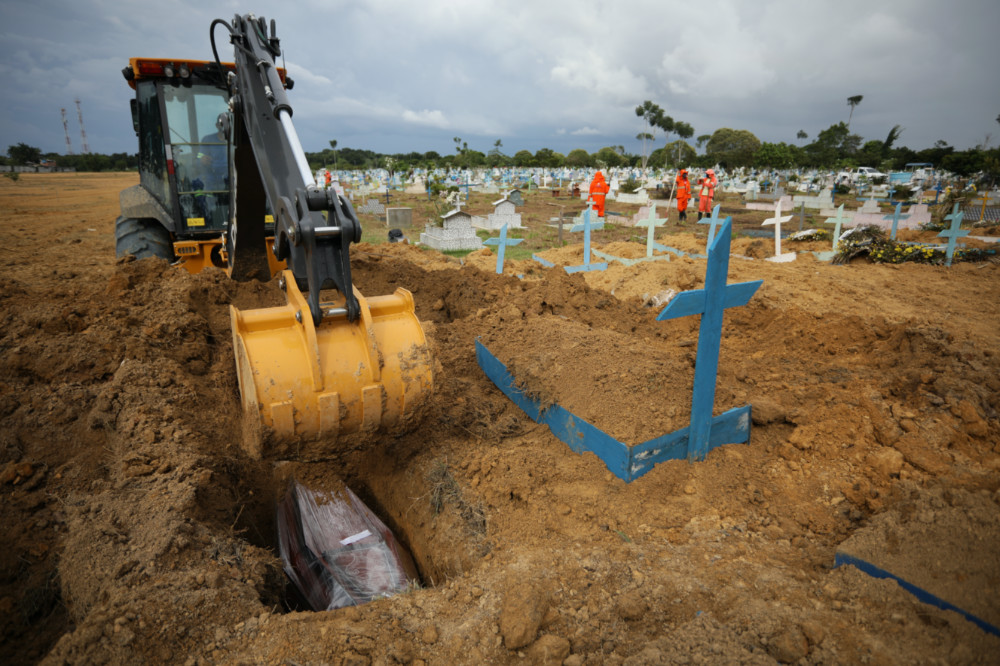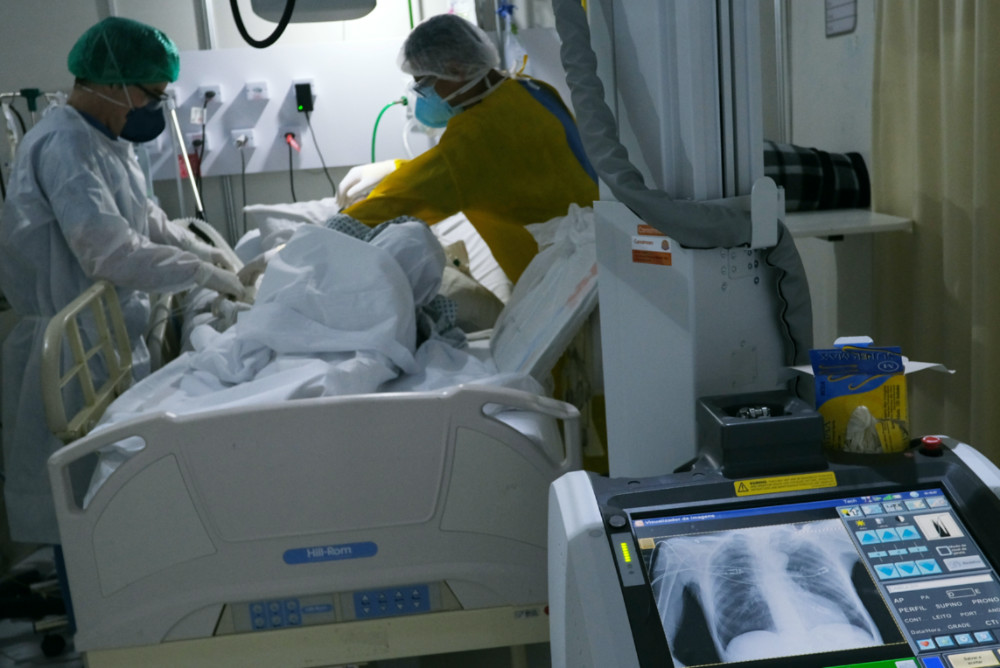
FABIO ZUKER, writing for Thomson Reuters Foundation, reports on claims from Indigenous leaders that the lack of priority vaccination status for all Indigenous Brazilians is just the latest sign of government neglect…
Sao Paulo, Brazil
Thomson Reuters Foundation
When Merremii Karao was invited to a clinic in the nearby town of Canindé in mid-January to receive her COVID-19 vaccine, other members of her Indigenous community in northeast Brazil’s Ceará state were hopeful they would soon be immunised too.
But while Merremii was photographed receiving her injection, with images distributed to the media, no other member of the Karao Jaguaribaras people in her village of Feijao has had the vaccine, said Gleidison Karao, a leader of the community.
“They used the image of [Merremii] to say everything was going well, but they haven’t really started the vaccination here,” he told Thomson Reuters Foundation by phone.

A gravedigger buries Joao Castro, 64, an Indigenous man of the Satere Mawe ethnicity, after he passed away due to the coronavirus disease (COVID-19), at the Parque Taruma cemetery in Manaus, Brazil, on 8th January, 2021. PICTURE: ReutersBruno Kelly/File photo.
Health experts warn that Indigenous people are more vulnerable to COVID-19 than the general Brazilian population due to factors ranging from lack of consistent healthcare to their culture of shared housing and food.
Brazil’s health ministry has said all rural Indigenous communities are part of a priority vaccination rollout.
Data from the health ministry highlights the slower-than-expected pace of vaccinating the country’s Indigenous people. As of 4th March, about 213,000 Indigenous Brazilians had received a first dose of the vaccine since the program started in January.
But Indigenous leaders in territories not yet formally recognised by the government – such as the Karao Jaguaribaras – say their people are not yet receiving injections.
Indigenous people living in cities also have not been included in the priority group, leaders say, which has left doctors worried they could carry the virus back to their home villages.
Data from the health ministry highlights the slower-than-expected pace of vaccinating the country’s Indigenous people.
As of 4th March, about 213,000 Indigenous Brazilians had received a first dose of the vaccine since the program started in January.
That is just over half of the 410,000 indigenous people the government has said it intends to vaccinate in the priority group.
The government has said it intends to deliver more than 350 million doses of the coronavirus vaccine to Brazilians by the end of the year.
But critics of the government’s efforts point to President Jair Bolsonaro’s public statements raising doubts about the need for vaccination and suggesting the country could wait to buy supplies until prices fall.
That has contributed to vaccine shortages in the country and a slower pace of vaccination, they say.
According to Brazil’s latest census, carried out in 2010, about 890,000 Indigenous people live in the country, more than a third of them in cities.
That suggests only about half of the country’s Indigenous population is in the government’s priority group for the first round of vaccinations.
Gleidison, the Indigenous leader, said the lack of priority vaccination status for all Indigenous Brazilians was just the latest sign of government neglect, particularly of groups whose territory is not yet officially recognised.
“They refuse to give us support,” Gleidison said. “They say we don’t have [approved] land.”
The government’s Indigenous affairs agency, Funai, directed questions to the Ministry of Health.
In an emailed statement, the ministry said anyone over the age of 18 living on recognised or unrecognised Indigenous territory will be vaccinated in the priority group, along with “older people, people with disabilities in care institutions [and] health professionals.”
Indigenous people living in all other rural contexts or in urban areas will be vaccinated in a future phase of the rollout, the statement said.

Health workers examine a patient suffering from the coronavirus disease (COVID-19) at Lagoa-Barra campaign hospital in Rio de Janeiro, Brazil, on 2nd July, 2020. PICTURE: Reuters/Ricardo Moraes /File photo.
Some Indigenous leaders and advocates say the government’s decision not to include all Indigenous people in the first priority vaccination phase reflects Brazil’s broader inability to protect Indigenous communities during the pandemic.
Last July, the country’s largest Indigenous organisation, APIB, filed a request with the Supreme Court for a more specific government plan to fight COVID-19 among Indigenous groups.
Following the request, Brazil’s Supreme Court repeatedly ruled the government should adopt measures to stop the spread of the virus to Indigenous communities.
That included a directive that Indigenous people living in unrecognised territories be part of the vaccination priority group.
By August 2020, the rate of coronavirus deaths among Indigenous people in Brazil’s Amazon was nearly 250 per cent higher than in the general population, according to research by IPAM, the Amazon Environmental Research Institute.
According to the Instituto Socioambiental, a leading national Indigenous advocacy group, there are 724 Indigenous territories in Brazil, with 487 so far officially recognised by the state.
Official approval of Indigenous land grants the communities the right to permanently live and work on it and means they can be treated by a separate healthcare subsystem.
Luiz Eloy Terena, an Indigenous lawyer with APIB, said many communities beyond the Karao Jaguaribaras are still waiting for recognition of their land – and vaccines.
He pointed to the Potiguara people, who live mainly in Rio Grande do Norte, in Brazil’s north-east. According to state data, there are about 18,000 Potiguara and Terena said none have been offered vaccines yet.
The lawyer said the failure to prioritise the vaccination of all Indigenous people violates Brazil’s constitution and several rights agreements, including the United Nations Declaration on the Rights of Indigenous Peoples.
Several prosecutors’ offices through the country, in states including Ceará, Pará, Paraná, Rondônia, and Minas Gerais, last month launched civil inquiries into irregularities in Indigenous people’s vaccinations.
The decision to exclude urban Indigenous residents from the current round of vaccinations can leave them particularly at risk, said Ana Lucia Pontes, an Indigenous health specialist and member of the Brazilian Association of Public Health (ABRASCO).
Indigenous people living in cities are among the most vulnerable to the virus, she noted, due to factors such as limited access to healthcare, sanitation and clean water as well as cultural and language differences.
“They are not people who will arrive in the city with a structure already in place, with the best conditions,” she said.
“In the first wave, as soon as the pandemic arrived in Brazil, it was the Indigenous people in urban areas who were at immediate risk,” she told the Thomson Reuters Foundation over the phone.
Douglas Rodrigues, a doctor with the Federal University of Sao Paulo who has worked with Indigenous groups for 30 years, said many Indigenous people live in the city for a short time, doing temporary work or accompanying children who are studying.
If they return unvaccinated to Indigenous villages, he worries what could happen.
“There is the possibility that a potentially infected Indigenous relative could come from the city and bring the virus into their community,” he said.





